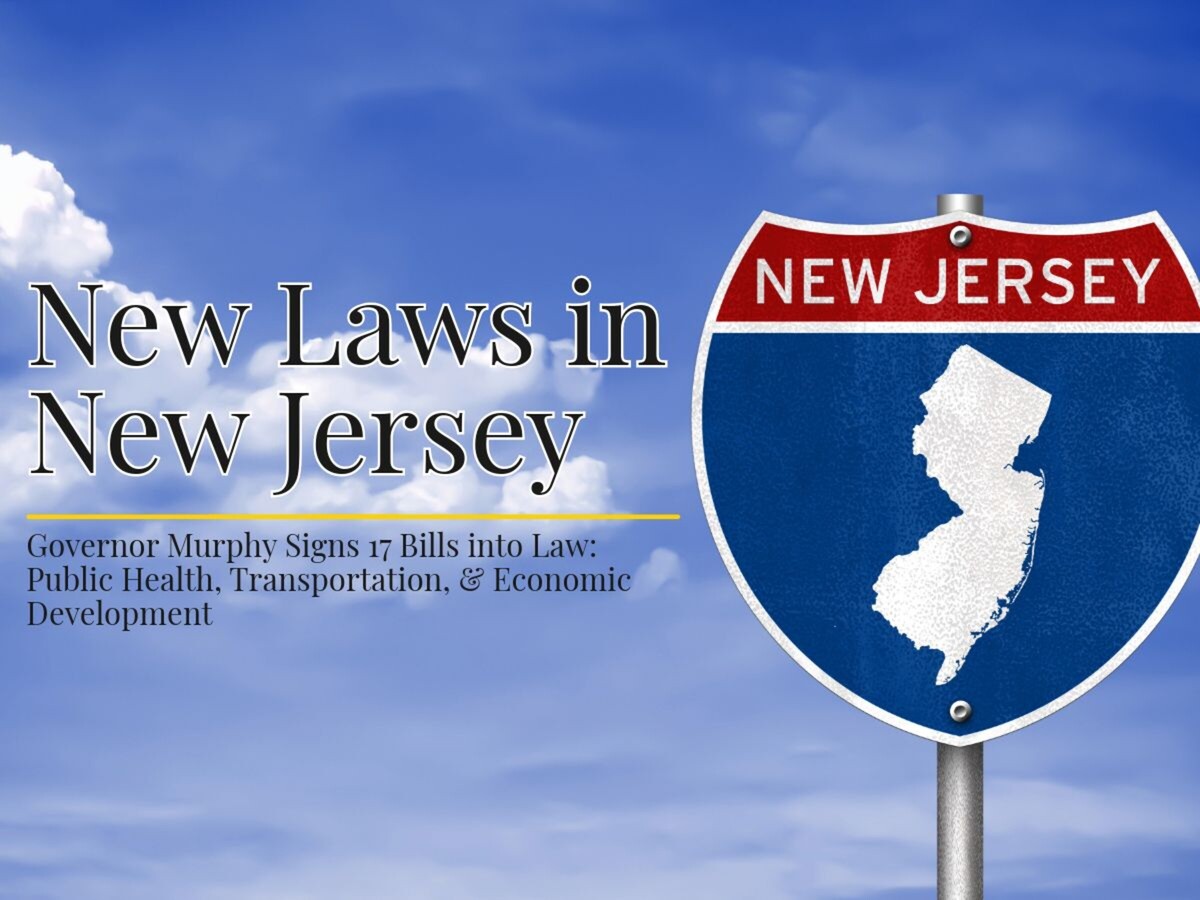Image


On September 12, 2024, New Jersey Governor Phil Murphy signed a series of 17 legislative bills into law, each addressing critical issues such as public health, economic development, transportation, and environmental safety. The newly enacted laws reflect a broad scope of legislative efforts aimed at enhancing the well-being of New Jersey residents and improving state infrastructure. Below is a breakdown of the key bills signed into law:
S-721/A-2812 (Steinhardt, Sarlo/Greenwald, Swain, Egan)
This bill exempts the sale of investment metal bullion and coins from sales and use tax. It aims to promote investment in precious metals by eliminating sales tax, potentially boosting New Jersey’s investment market.
S-741/A-2608 (Diegnan/Karabinchak)
This legislation authorizes the State Treasurer to sell certain surplus real property and improvements located in Jersey City, Hudson County, as part of ongoing efforts to streamline state-owned property management.
SCS for S-2188/ACS for A-1970 (Ruiz, Greenstein/Speight, Karabinchak, Verrelli)
This significant public health bill requires the Department of Environmental Protection (DEP), Department of Health (DOH), and operators of public community water systems to take specific measures to prevent and control outbreaks of Legionnaires' disease, a serious form of pneumonia caused by bacteria found in water systems.
S-2311/A-1128 (Singleton, Singer/DiMaio, Matsikoudis)
To safeguard patient safety, this law mandates criminal background checks for individuals seeking licensure in certain healthcare professions regulated by state boards.
S-2435/A-3537 (Greenstein, Mukherji/Stanley, McCoy, Murphy)
The new law revises eligibility requirements for receiving reimbursement from the Emergency Medical Technician (EMT) Training Fund, ensuring that EMTs who meet certain updated criteria can be reimbursed for their training costs.
S-2607/A-3872 (Ruiz, McKnight/Pintor Marin, Calabrese, Speight)
This law requires private bus operators to provide public notice and hold public meetings before making significant service changes, giving riders a voice in decisions that may affect their commutes.
S-2810/A-3779 (Diegnan/DeAngelo, Karabinchak, Bagolie)
The membership structure of the board of trustees of the State Police Retirement System (SPRS) has been modified to remove the requirement that two members must be private citizens.
S-3097/A-4226 (Pou, Sarlo/Wimberly, Sumter)
The law modifies the requirements for certain projects eligible under the Economic Redevelopment and Growth Grant (ERG) program, facilitating the application and approval process for redevelopment projects.
S-3134/A-4192 (Diegnan, Moriarty/Calabrese, Carter)
This law directs the Motor Vehicle Commission (MVC) to implement certain procedural changes regarding commercial driver licenses (CDLs) and commercial learner’s permits (CLPs) to improve safety and licensing efficiency.
S-3235/A-4461 (Ruiz, Moriarty/Conaway, Miller, Sampson)
The production and sale of certain intoxicating hemp products are now subject to state regulation under this new law, aiming to safeguard consumers and regulate the growing hemp industry.
S-3368/A-4623 (Ruiz, McKnight/Calabrese, Stanley, Reynolds-Jackson)
In response to ongoing concerns about lead poisoning, this law enhances protections for residential tenants against lead-based paint hazards, particularly in older buildings.
S-3407/A-4540 (Lagana/Verrelli)
This law requires contractors working on clean energy projects financed through the Commercial Property Assessed Clean Energy (C-PACE) program to pay workers the prevailing wage, ensuring fair compensation in the growing clean energy sector.
A-2610/S-3203 (Karabinchak, Calabrese, Sauickie/Gopal)
This bill extends the annual horse racing purse subsidies through the 2029 fiscal year, providing continued financial support to the state’s horse racing industry, which plays a key role in New Jersey’s economy.
A-2890/S-3231 (Verrelli, Reynolds-Jackson, Quijano/Cryan)
The new law permits the temporary appointment of additional members to the Board of Review in the Division of Employment Security, which handles appeals related to unemployment insurance.
A-4035/S-2809 (Dunn, Speight/Bucco, Pennacchio)
This bill requires the state to sell certain land and improvements in Morris County, known as Central Park School, as surplus property, potentially allowing for new development opportunities in the area.
A-4533/S-3421 (Coughlin, Wimberly, Speight/Zwicker, Johnson)
This law revises sections of the financing mechanisms available for school facilities projects in regular operating districts, helping schools access the funds needed for critical infrastructure improvements.
A-4534/S-3439 (Coughlin, Wimberly, Schnall/Vitale, Mukherji)
The definition of qualified assistance fund expenses under the Urban Enterprise Zone (UEZ) program has been revised to include costs associated with transportation infrastructure projects and related debt service, offering new avenues for urban development funding.
The newly signed legislation is set to address a variety of important issues affecting New Jersey communities, ranging from public health improvements and economic development to enhanced protections for residents and workers. These laws are expected to have a direct impact on everyday life, providing better safeguards against health risks, expanding opportunities for investment, improving infrastructure, and ensuring fair treatment for employees and consumers alike. As these changes take effect, they could lead to improved living conditions, job growth, and a more resilient local economy.